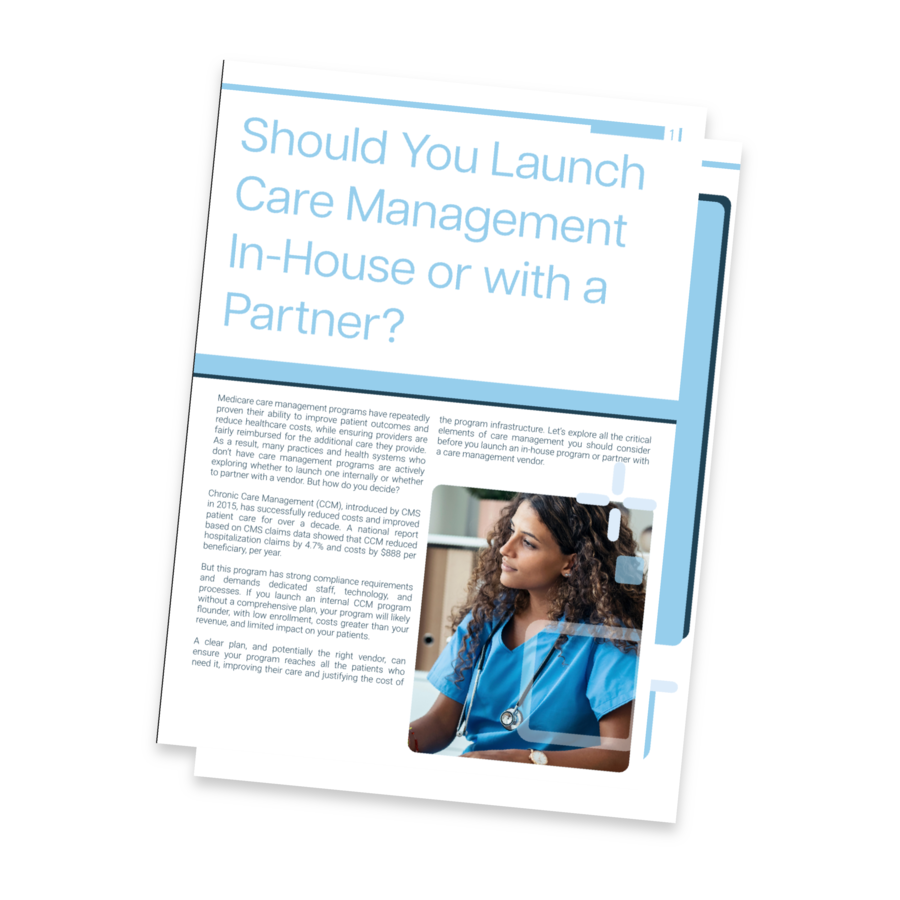
Talk with a ChartSpan Representative Today!
Our team is ready to help you improve patient care and outcomes.
Blog
Myth Buster: Our Practice Can Manage our CCM Program Ourselves
Did you know that Medicare fee-for-service beneficiaries with multiple chronic conditions account for 93%* of total Medicare spending? Nearly five years ago, Medicare launched a new benefit called Chronic Care Management (CCM) along with several new CPT codes to encourage providers to engage in preventative care practices with their chronically ill patient populations.
But the reality is that physician groups have been slow to implement CCM programs. According to a recent Porter Research study, only 46% of applicable providers are currently offering a CCM program to their patients. The same survey revealed that the majority of providers are attempting to manage their CCM programs with their own resources. Given the operational and clinical complexities required to build and manage a profitable and productive CCM program are significant, providers should consider the option of partnering with a specialized CCM managed service provider.
Let’s take a closer look at the top three challenges providers who are trying to do CCM on their own are experiencing:
1) Overhead
According to the Bureau of Labor Statistics, registered nurses earned an annual median salary of $70,000 in 2017. If you multiply the $43 average payment for CCM by 100 patients, times 12 months, it totals $51,600 – far below a nurse’s salary, even without other overhead costs factored in. Plus, if one nurse or staff member is charged with supporting 100 CCM patients, they are not likely to be able to dedicate the time and energy to support all 100 patients effectively.
2) Turnover/Redundancy
If the practice does have someone with the expertise and experience to tackle a CCM program, there’s no guarantee he or she won’t leave. If you do lose that expert, you also may lose momentum as a new person is brought up to speed and re-establishes contact with patients.
3) Technology
Many providers depend on their electronic health record (EHR) systems to support their CCM programs. So while EHR systems can be used to help identify eligible patients, the operational complexities of managing a successful CCM program require advanced technology, such as 24x7 call center and patient contact management system. These systems can be expensive, difficult to maintain and often hard to justify when the enrolled population is relatively low.
To address these and the many other operational challenges associated with a CCM program, many providers are outsourcing their CCM program management to companies like ChartSpan who specialize in delivering preventative care programs.
ChartSpan is the largest care coordination provider, partnering with hundreds of providers and tens of thousands of patients. With its highly trained care management team and advanced technology solutions, ChartSpan will reach out each month telephonically and/or electronically to your enrolled patients – those with multiple chronic conditions who are the most in need of your attention and support.
ChartSpan’s turnkey solution handles every step of the program, from identifying eligible patients and the initial outreach for enrollment to providing around-the-clock access to nurses. We deliver a turnkey solution that integrates with your workflow, reduces staff workload and delights your patients.
And then you see the results – with analytical reports that let you know exactly how the program is progressing so you can monitor the success, without the heavy lifting that internal CCM programs usually involve.
Without substantial investments in people, technology and time, practices are simply setting themselves up for failure when they try to DIY.
If you’d like to learn more about why practices are failing at CCM, check out our new white paper.
Subscribe for More Insights
Get valuable resources delivered straight to your inbox.
"*" indicates required fields





